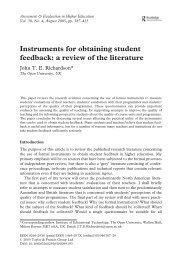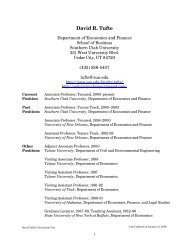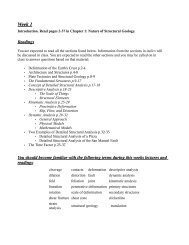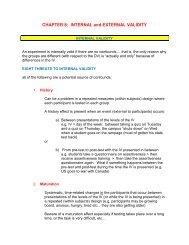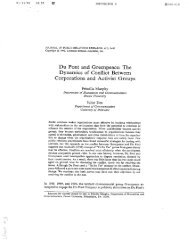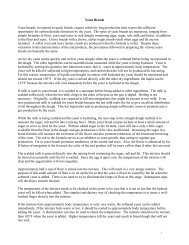Jeffrey Barnes: Self-Evident Truths - Southern Utah University
Jeffrey Barnes: Self-Evident Truths - Southern Utah University
Jeffrey Barnes: Self-Evident Truths - Southern Utah University
You also want an ePaper? Increase the reach of your titles
YUMPU automatically turns print PDFs into web optimized ePapers that Google loves.
Some philosophical discussions view being moral and virtuous related to living in<br />
concordance with the “good” values identified by reason and evidence. (See list of<br />
selected values in the appendix). Some philosophical musing ask, “Why be moral?”<br />
This paper’s propositional model declares that being moral brings greater happiness and<br />
contentment to the individual and society. The absurd question would be “Why not be<br />
immoral?” The trail of evidence, especially those which are long-term in nature and not<br />
so readily identified, bears witness to the obvious reasons to not live immoral lives. My<br />
propositional model does well by asking the reader to integrate into action the desire to<br />
live virtuous, moral, and good lives.<br />
Why should we be concerned for virtue and morality? There appear, through<br />
philosophical deliberations, to be five supporting reasons:<br />
(1) To keep society from falling apart,<br />
(2) To ameliorate human suffering,<br />
(3) To promote human flourishing,<br />
(4) To resolve conflicts of interest in just and orderly ways, and<br />
(5) To assign praise and blame, reward and punishment, and guilt.<br />
(Pojman, 2002: page 17)<br />
These five reasons apparently sustain an orderly society in which all individuals can<br />
experience greater happiness and peace. Aristotle wrote,<br />
The end toward which men strive in life is happiness. Happiness for each<br />
creature is founded in the best possible performance of the function for which he<br />
is peculiarly adapted. Man then finds his highest and most lasting happiness in<br />
the active life of his soul in accordance with virtue.<br />
________________________________________________________________________<br />
What is you definition of virtue? Does ancient greek definition of virtue differ from a<br />
contemporary American definition of virtue?<br />
________________________________________________________________________<br />
Richard Vetterli and Gary Byrner wrote concerning the evolving definition of virtue in<br />
public discourse and politics:<br />
Recent scholarship on the American founding has often failed to give sufficient<br />
attention to the evolutionary character of the concept of virtue. When historians<br />
refer to virtue, they are often drawn back to classical antiquity, narrowing their<br />
definition of the term to its ancient expression, and confusing it with the ‘modern’<br />
concept of virtue. Centuries before the Constitution was written, the concept of<br />
virtue had begun its metamorphosis. It had, over time, become infused with<br />
biblical Christianity, which had become a kind of ‘general Christianity,’ even<br />
Page 11 of 33






